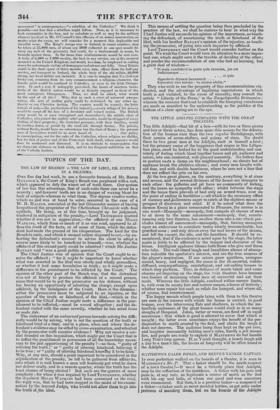THE LITTLE ADELPHI COMPARED WITH THE GREAT THEATRES.
THE little Adelphi—that bit of a box—with it two or three pieces and two or three actors, has done more this season for the delecta- tion of the human race than the two ngular Brobdignags, with their armies of scene-shifters, and galaxy of stars. No doubt there be two great men at the Adelphi, each in himself a host ; but the primary cause of the happiness that reigns in this Lillipu- tian place, must be looked for in the good understanding and una nimity of feeling which blend together boxes and pit, audience and actors, into one contented, well-pleased assembly. No listless face or posture casts a damp on the neighbourhood ; no shouts but of applause break the attentive silence ; and every man laughs with- out fear, and with double heartiness, where he sees not a face that does not reflect the grin on his own. At the two great places, on the contrary, everything is at sixes and sevens, and the several divisions of the house are strangers to each other : the galleries and pit have no community of feeling, and the boxes no sympathy with either; whilst between the stage and the house there prevails at best only an armed truce, ever on the point of ending in hostilities ;—all which is the necessary effect of vacancy and,listlessness eager to catch at the slightest means or prospect of diversion and relief. If it be asked what does the dmon Ennui in a place :consecrated to Pleasure, the answer is in one word—Monopoly—monopoly, that compels all classes of men to sit down to the same amusement—monopoly, that, counte- nancing only two theatres, has swollen them into a size which pre- cludes almost all amusement—monopoly, that, forcing managers upon an endeavour to conciliate tastes utterly irreconcileable, has gratified none ; and only driven away the real lovers of the drama, and left the vacant, the idle, and the heartless. It should be re- membered, that if the audience is acted upon by the stage, the latter again is liable to be affected by the temper and character of the house. Intelligent applause blesses both those who give and those who take. The well-timed laugh and breathless silence of absorp- tion redouble the spectator's interest, and are the true sources of the player's inspiration. If our actors grow spiritless, unimpas- sioned, heavy, and negligent, the cause is the ill-assorted, widely- diffused, unsympathizing, unintelligent, and cat-calling houses to which they perform. Thus, in defiance of much talent and some charms yet lingering on the stage, the twin theatres have become two houses of mourning where men sit sorrowful and eat their souls. Whereas the little Adelphi, confined within narrow limits, is, with even its scanty fare and narrow means, a house of festivity ; whither none repair but such as relish the banquet, and where all, of course, find entertainment.
The happy moods which people bring with them to this theatre are seen in the success with which the house is carried, in good temper, over the intervening flats and shallows, in which the me- lancholy audiences of the great houses would stick as in so many sloughs of Despond. Jokes, better or worse, are fired off in rapid succession : that which is good is allowed to cover that which is naught ; the latter even sometimes enjoys the benefit of the pre- disposition to mirth created by the first, and elicits the laugh it does not deserve. The audience being thus kept on the qui vive, and laughter incessantly tickling men's sides, hardly a jest misses fire, and people are ready to explode if MATTHEWS do but handle Long Tom's long queue. If, as Yorick thought, a hearty laugh add a day to a man's life, the lovers of longevity will be often found in the Adelphi.


















 Previous page
Previous page